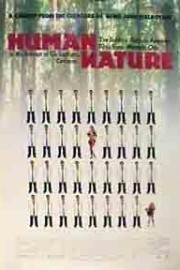Human Nature
“Human Nature” is most known as the first produced script after “Being John Malkovich” from Charlie Kaufman, that wily, devious mind whose scripts are explorations into, well, human nature. However, more importantly, “Human Nature” is the first feature film for Frenchman Michel Gondry, a music video wizard who would go on to direct “Eternal Sunshine of the Spotless Mind” (one of the best films of all-time), “The Science of Sleep,” and the quirky and wonderful “Be Kind Rewind.” It’s a match made in heaven.
“Human Nature” is a film that looks at its title through the quirks of its main characters. Patricia Arquette’s Lila is a woman who, at 12-years-old, started to grow hair all over her body. Eight years later, as she’s prepared to commit suicide, the look of a mouse (non-judgmental of her condition) saves her life. She begins to live in the woods, becoming a successful nature writer. She also begins to go through electrolysis to try and rid herself of her hair. It’s during this time in her life when she meets Nathan (Tim Robbins), a psychologist whose civilization-obsessed parents has led to his own obsession- teaching table manners to mice. Despite their differences, they are of like minds when it comes to nature, and they fall in love, although Lila is not quite forthcoming about her own history.
As they walk in the woods one day, they come across a feral human being (Rhys Ifans), whose father thought himself an ape. Lila shares a genuine connection to this creature, although all Nathan sees is the possibility for a human subject on whom he can experiment. Can he take this being, whom he and his assistant Gabrielle (a saucy Miranda Otto, sporting a sexy French accent) have named Puff, and turn him into a functioning member of society? Well, since the first time we see Puff he’s testifying before Congress, I think it’s safe to say he’s succeeded. Of course, the first time we see Nathan he has a gunshot in his head and he’s in an all-white room. And did I mention Lila’s in jail?
At its core, “Human Nature” is fundamentally a sex comedy unlike any other. Kaufman’s a pretty odd creature in and of himself. Who else would write himself a fake brother in one project (Donald in “Adaptation.”); would write a portal into John Malkovich’s brain that dumps you onto the New Jersey Turnpike; and would write an epic of the human mind where a theatre writer would write characters based on everyone in his life, including himself, in an effort to understand himself? That last one is 2008’s “Synecdoche New York,” and it’s the first film he’s directed himself. I’ve seen it several times now, and even I haven’t gotten to the bottom of it.
“Human Nature” is his least compelling film– despite the intriguing ideas within the film, it’s still pretty rough around the edges (even though it does have a good glimpse of Gondry’s stylistic genius) –but it’s unquestionably entertaining. All of these actors understand great material when they’re offered it. Robbins is not known for comedy, but he understands Nathan to his core; this is a man whose upbringing has caused less understanding of humanity than more, resulting in an uncertainty in himself and a desire to bend the world to his view. Robbins plays it perfectly. The best roles, however, are given to Arquette and Ifans, and they deliver career-best turns as two people who have been unable to give into their basest desires for most of their lives, and are unable to further when they are around Nathan, who’s wound tight until Gabrielle starts flirting with him in the course of their work. With such a game cast, it’s easy to see how Gondry and Kaufman were able to make such flawed material so witty and funny. Like anything else they’ve made, it’s unlike anything else you’ve seen. You just kind of have to go with it.










